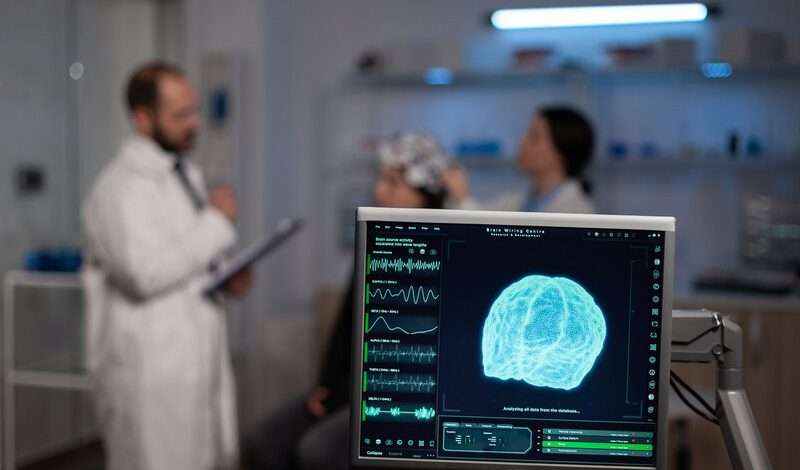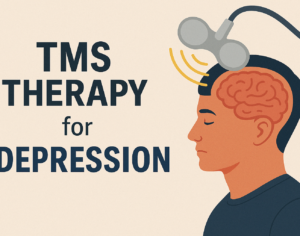Depression Treatment: What Is TMS?
Depression is a complex mental health condition. Some people may experience seasonal depression, others may go through brief episodes of depression, while others can be clinically diagnosed with a major depressive disorder. Even how each individual manages and treats their depression will vary. Some people will find treatment highly effective, with noticeable improvements in their condition. On the other hand, a percentage of people with depression can experience treatment-resistant depression. In this case, people with depression will need to explore methods beyond medication and traditional therapy, such as Transcranial Magnetic Stimulation, or TMS.
The team of experts at My Psychiatrist specializes in mental health treatment and therapy for patients experiencing a wide range of mental health conditions. With the rising prevalence of depression and anxiety in the general population, we have equipped our office with more ways to help patients manage their condition, protect their mental health and improve their wellbeing.
How Depression Affects The Brain
Depression is more than just a state of mind. Especially in patients diagnosed with Major Depressive Disorders, there are areas of the brain that are activated less and through a cycle of repetition, the effects can be compounding.
Studies using MRIs to observe regional brain activation found significant alterations in major depressive disorder patients, such as in the frontal lobe, hippocampus, temporal lobe, thalamus, striatum, and amygdala. Rather than one area being solely responsible for depression symptoms, it may be a combined effect as these regions attempt to communicate in a circuit.
Patients with depression commonly express that they would love to get better; that they really don’t want to feel and live like this, but that their condition prevents them from getting better. Depression can trigger dangerous and harmful thought patterns that serve only to make their condition worse. Patients often think less of themselves, wrongly convincing themselves that they ‘don’t deserve treatment’. The problem is that depression can distort your identity. Being stuck in these negative thought cycles will eventually change the way you view yourself, and the way you treat yourself thereafter.
Transcranial Magnetic Stimulation
For patients with Major Depressive Disorder or treatment-resistant depression, meaning medication or other methods haven’t provided any improvements, Transcranial Magnetic Stimulation (TMS) may be the answer.
Click here for more resources and information on Transcranial Magnetic Stimulation (TMS)
How TMS Therapy Works?
This non-invasive therapy uses gentle magnetic stimulation, induced through your scalp via carefully placed coils, to affect specific areas of the brain that have seen decreased activation due to depression.
Once the coil placement and optimal intensity are identified, treatment sessions can begin. Here’s what to expect during each treatment:
- You’ll be seated in a comfortable chair, wearing earplugs, with the magnetic coil resting your head.
- As the machine is activated, you may hear clicking sounds and gentle tapping near the focus area.
- The procedure will last about 40 minutes, and you’ll remain awake and alert. Some patients take this time to meditate, while others spend the time reading a book!
This treatment doesn’t require you to be anesthetized and is non-invasive. This means that there is no downtime following your sessions, so you can return to your day immediately after each session. There are very few mild side effects and serious side effects are very rare.
Patients have noticed considerable improvements within the first 15 sessions. Improvements in their self-image, restored motivation, general happiness, regulated mood, and much more!
The Benefits of TMS Therapy Include:
-
- Non-Systemic: Nothing enters the bloodstream
- Non-Sedating: Patient remains awake and alert during treatment and can resume usual routine
- Non-Invasive: Nothing is inserted or implanted into the body
- Non-Drug: No drug-related side effects such as weight gain, drowsiness, sleeplessness, stomach upset, or sexual problems
- FDA Cleared & Proven: 2 out of every 3 patients had a reduction in depression scores after a 4-week treatment period
- Covered by Most Insurance Plans
TMS Therapy Available in Falls Church & Reston, VA
If you or a loved one have been searching for a solution to treatment-resistant depression, reach out to the specialists at My Psychiatrist to learn more about Transcranial Magnetic Stimulation (TMS) therapy. Our team is happy to answer any questions you may have, as well as help outline the therapy process!
Call our office to speak with a member of our team or schedule a consultation online today!




